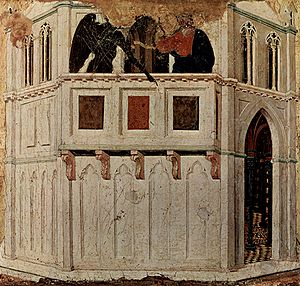- Matthew 4:6
-
Matthew 4:6 is the sixth verse of the fourth chapter of the Gospel of Matthew in the New Testament. Jesus has just rebuffed Satan's first temptation in this verse the devil presents him with the second one while the pair stands on the pinnacle of the Temple of Jerusalem.
In the King James Version of the Bible the text reads:
- And saith unto him, If thou be the
- Son of God, cast thyself down: for it
- is written, He shall give his angels
- charge concerning thee: and in their
- hands they shall bear thee up, lest at any
- time thou dash thy foot against a stone.
The World English Bible translates the passage as:
- and said to him, "If you are the
- Son of God, throw yourself down, for
- it is written, ‘He will put his angels
- in charge of you.’ and,‘On their hands
- they will bear you up, so that you
- don’t dash your foot against a stone.’
For a collection of other versions see BibRef Matthew 4:6
As with Matthew 4:3 Satan is not doubting that Jesus is the Son of God but rather is stating that he should do these things because he is the Son of God. Satan here is trying to convince Jesus to throw himself from the pinnacle of the temple because God has promised that he will not be hurt. To advance this temptation the devil quotes scripture, something Schweizer sees as an escalation over the first temptation.[1] The verse quoted is from Psalm 91:11-12. In the KJV those verses read:
- For he will command his angels concerning you
- to guard you in all your ways;
- they will lift you up in their hands,
- so that you will not strike your foot against a stone.
Satan omits the line "to guard you in all your ways." Gundry notes that the original wording makes it clear that God is promising only to protect from accidents, not from deliberate acts such as the one Satan is proposing.[2]
The exact evil Satan is trying to induce in this verse is open to debate. The traditional view was that the temptation narrative was one of rejecting sin and this test was simply Satan luring Jesus with the sin of hubris. Most modern scholars reject this view of the temptation. A view that was popular for a time was that the three temptation sequences each represent Jesus rejecting one vision of what the Messiah should be. In this verse Satan tries to convince him that he should be a magician and miracle worker who wins converts by his spectacular acts. Gundry notes that the choice of the Temple as a setting is evidence for this theory. There are many precipices in the wilderness, that Satan brings him to the top of the temple implies that the miraculous rescue would be a very public act.[3] A view that is in vogue today is that Satan is placing before Jesus the same pitfalls that the Jewish people fell into during the period after Exodus. In the desert the Israelites attempted to test God and Satan is proposing that Jesus do the same. This interpretation fits most closely with Jesus' response to this temptation in the next verse.
References
- ^ Schweizer, Eduard. The Good News According to Matthew. Atlanta: John Knox Press, 1975
- ^ Gundry, Robert H. Matthew a Commentary on his Literary and Theological Art. Grand Rapids: William B. Eerdmans Publishing Company, 1982.
- ^ Gundry, Robert H. Matthew a Commentary on his Literary and Theological Art. Grand Rapids: William B. Eerdmans Publishing Company, 1982.
Gospel of Matthew Preceded by:
Matthew 4:5Chapter 4 Followed by:
Matthew 4:7Categories:- Gospel of Matthew verses
- Satan
Wikimedia Foundation. 2010.

